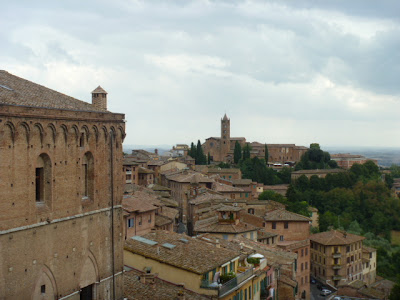In the house of St Catherine are displayed things like the stone she used as a pillow and other forms of penances. She used to fast a lot and to make big sacrifices. Those practices were common during her time in the middle ages and seem to us today rather bizarre. But even much striker for us is to know that modern saints like Pope John Paul II also used some forms of discipline, like sleeping on the wooded bare floor.
Those things do not make sense in our modern culture where the satisfaction of comfort is the goal for which we work hard. But even though I had understood the concept of taking the discipline as a way to configure ourselves with the sufferings of Christ, I could hardly explain it to make sense.
Praying vespers on Friday, I finally could figure out the point on taking the discipline. And it is not so different from St Anthony of the Desert in the early church to Blessed John Paul II in the Third millennium. The same passions, the same bodies, the same problem, the same goal. One of the intercessions says: Christ, our frail humanity is prone to fall; strengthen us through your help. Left to itself, our nature is inclined to sin; let your love always restore it to grace.
Thomas Morton explains that the passions are like children, who left to themselves, will take over the whole house. So they need to be disciplined and corrected. On the same way the passions; otherwise the passions will dominate our lives with sin. We don’t talk about the elimination of the passions, rather of their purification and refocusing. We Christians are not dualists. We honor the body and the material world as we honor the soul and the spiritual. Remember that we are saved both in body and spirit. Look at Mary. This is the point of her Assumption.
Our frail humanity is prone to fall and left to itself, our nature is inclined to sin. We all can say it with certitude, we expert sinners. So the taking the discipline help us to refocus the energy of the passions towards the true worship of God. St Paul urges us to offer our bodies as true and living sacrifice. It helps us to empty ourselves so to have space for God.
Father Barron offers a clear example of this, for us today. Let’s go to a work out center. What we find there is people sweating and “torturing” their bodies for a great benefit: healthy bodies. And often, it is accompanied by strict diets and abstinence of a lot of goodies. What if we use it for an even greater benefit: the health of the soul!
I have been fighting laziness. I am not a morning person at all, lest a sport man. I admire all of you who are. And with this order of thoughts, I have been swimming for, at least, an hour every other day. Primarily for the benefit of my soul, uprooting laziness of my being, I’ve been gaining a healthy body.
Let’s be as prompt and smart with the matters of the spirit as we are with the matters of the world. “Our enemy is prowling around like a roaring lion is looking for someone to devour” (1 Peter 5, 8-9).
 |
| Mass in St Catherine's house |
 |
| Image of Blessed Pope John Paul II |
 |
| 25 Laps today |










